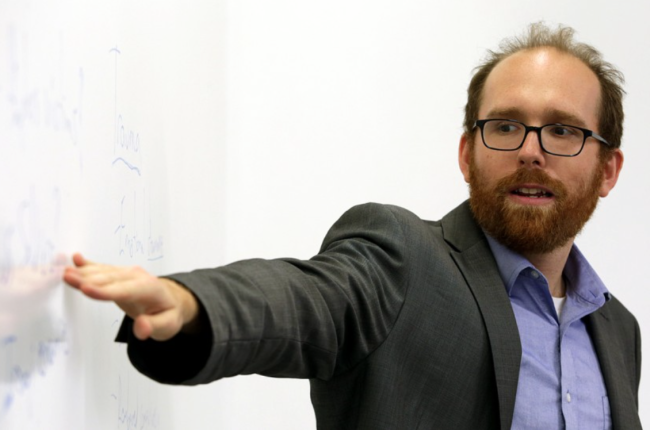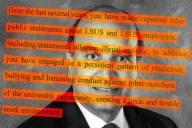You have /5 articles left.
Sign up for a free account or log in.

Alexander Young, a preceptor in English, teaches a course at the University of Southern California.
U of Southern California
Many humanities and social science Ph.D.s leave graduate school and are thrust into adjunct employment as they seek out more permanent positions. Others take on postdoctoral fellowships -- essentially full-time teaching or research gigs -- under one or two-year contracts that may offer little in the way of mentorship. The University of Southern California has created an alternative for a select number of recent graduates, offering them full-time employment, with benefits, for up to two years. In return, these Ph.D.s teach four class discussion sections for a faculty mentor, as well as a course of their own design.
“It has allowed USC to retain some of its most talented Ph.D.s in the classroom,” said Alexander Young, a recent English Ph.D. who is helping pilot the program. And from a fellow’s perspective, he said, it’s “given me the stability that adjuncting at multiple institutions would not have afforded me. I have been given wide latitude in designing and teaching my own humanities seminar, which has been a fantastic experience -- few job seekers at my stage are granted that kind of opportunity to build their teaching profile.”
Called the David and Dana Dornsife College of Letters, Arts and Sciences Preceptor System, the program is inspired in part by Woodrow Wilson’s preceptorial method. In 1905, when he was president of Princeton University, Wilson pushed a style of learning in which small groups of students met regularly with a faculty member for more intimate academic discussions than could be had in the regular classroom.
The Dornsife program seeks to replicate that style by providing graduate students -- all recent USC Ph.D.s in the humanities and social sciences -- an opportunity to teach their own courses and lead discussions under the supervision and mentorship of faculty members.
“I wanted to create a program that allowed our graduate students to teach their own courses,” said Steven Lamy, Dornsife’s vice dean for academic programs, noting that current graduate students at USC only serve as teaching assistants, not instructors.
The program gives recent graduates increasingly valuable teaching experience to take out onto the job market. Preceptors also play a role in the university’s newly revised general education program, which includes seminars required of all first-year students, since these are the courses the fellows tend to design and teach.
Launched this semester, the program accepted applications starting in February for three positions in the humanities and three in the social sciences. The university said it was looking for applicants with excellent academic records and notable teaching evaluations as teaching assistants or assistant lecturers.
Míchel Angela Martinez, a preceptor in political science, said she was encouraged to apply by her department, based on her strong teaching record. Martinez said she’s not the typical Ph.D. -- she obtained her doctorate to further her work as a political and social activist, not an academic career. But she said the program has been rewarding so far in that she’s been able to design a popular course on activism.
Martinez is also enjoying working with a faculty mentor with whom she was close as an undergraduate and graduate student, she said.
“After I left, she kept berating me to go to graduate school -- she said, ‘You’re smart, you can do this,’” Martinez said of her mentor, Alison Dundes Renteln, professor of political science, anthropology, public policy and law. “We have a really good relationship.”
Each semester, preceptors teach one seminar course of their own design and lead four discussion sections, ideally of the same or related courses -- typically general education.
Preceptors may serve for up to two years; at the end of this year, the records of current preceptors who wish to stay on will be evaluated by their respective departments and the dean’s office.
The university said it doesn’t release salary information, but said that preceptors make the equivalent of full-time, non-tenure-track faculty members and receive full benefits.
Lamy, the vice dean, said he thought that the preceptor program was “in the same family” as other postdoctoral programs, but that the reduced teaching load as compared to many postdocs allows preceptors to work on turning their dissertations into a book or articles.
Program guidelines say preceptors should be working on this kind of research about 25 percent of the time. There are no additional research expectations that come with most postdocs, Lamy said. Renteln, Martinez’s mentor, said she thinks USC’s program differs from other postdocs primarily in that it focuses on pedagogy.
“The newly minted Ph.D.s have a chance to create a course related to areas of expertise, and that enriches a department on campus,” she said. In Martinez’s case, she added, her activism course is already earning “rave reviews” and is “sparking student interest in politics.”
Martinez is serious about encouraging students to get involved in social justice movements, Renteln said. “In her course, they learn how to collaborate and how to be effective leaders.”
Martinez said there’s not too much time left over between her teaching obligations to do much else, and that she’s had to cut down on some of her outside activism as a result. But it’s “also an issue of time management,” she said.
Young, the preceptor in English, agreed that teaching four discussion sections and a seminar makes for a challenging -- but rewarding -- experience.
“The teaching load is a challenge, but is comparable, I think, to the workload I will be managing as an assistant professor between teaching, research and service,” he said. “I'm already busy with job applications, preparing my book proposal and conference talks.”
He added, “Juggling the job market, research and teaching as a preceptor requires some focus and dedication, but that's what the profession demands.”
USC isn’t alone in trying to enhance the postdoc experience. The College of the Holy Cross, for example, has structured its postdocs and visiting assistant professorships in ways that provide more mentorship. And among research universities, for example, where postdocs often say they feel like another adjunct faculty member, the University of California at Irvine recently launched a program in which graduate students who finish their degrees in five years may apply for an up-to-two-year, teaching-intensive postdoc. These fellows, or assistant adjunct professors, as they’re known at Irvine, are supposed to have time left over to do additional, résumé-boosting research and apply for tenure-track jobs.
Russell A. Berman, professor of German studies and comparative literature at Stanford University -- which announced its own five-year humanities Ph.D. plan several years ago -- and past president of the Modern Language Association, has been a vocal supporter of reforming graduate education in the humanities -- particularly in light of the difficult tenure-track job market.
Berman said that the USC program on its face looks promising, given widespread concern about the need for greater focus on the preparation of future teachers.
“This kind of program at USC can give the young scholar an opportunity to get broader teaching experience, especially if they receive mentorship and professional development opportunities,” he said.
Still, Berman said he had concerns about postdoc or similar positions in general, in that they extend the “precarity” of a young scholar’s employment prospects. More focus on teaching preparation is a good thing, he said, but it should be part of graduate school, not “postponed” into postdocs.
“It may be becoming more common for new Ph.D. recipients in the humanities to be expected to spend some years in such bridge positions -- teaching postdocs, visiting assistant professorships, etc.,” Berman said via email. “These may represent opportunities to gain experience, especially in teaching, but these years also add to the ‘time to job security.’”
People speak of the “postdoc trap” in the life sciences, and the humanities may be moving in that direction, he said. “Of course, for any individual it is beneficial to get such a bridge position, but it is not clearly a good development for the profession. It's really a variant of contingent work force; professional associations should take this up as a topic.”









